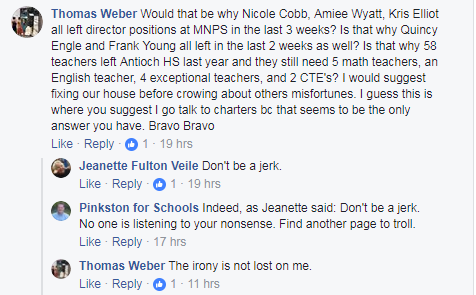I reported last week on the Data Wars brewing between the state’s two largest school districts and the Tennessee Department of Education.
Now, as both Nashville and Memphis dig in, MNPS is offering a trade of sorts.
Chalkbeat reports on a letter sent by MNPS Board Chair Anna Shepard to Education Commissioner Candice McQueen.
In her letter, Shepard proposes cooperation between the state’s Achievement School District (ASD) and MNPS based on several conditions.
Specifically:
I would personally be willing to consider a coordinated initiative under which MNPS, using its existing communications infrastructure, would inform families about ASD choice options — if they choose to “opt in” to such communications. I cannot speak for my board colleagues until such time as we have had the opportunity to deliberate on this concept.
Shepard’s conditions:
- A moratorium on ASD expansion
- State subsidies for schools that lose students to the ASD
- The State engage in discussions around a new “fiscal impact” component of the BEP to address the impact charter schools have on local school districts
Regarding that fiscal impact, an audit of MNPS published in 2015 noted this:
“The key question for determining fiscal impacts is whether enrollment reductions allow a district to achieve expenditure reductions commensurate with revenue reductions. Fixed costs are incurred regardless of whether students attend traditional or charter schools. The problem is that some fixed costs, such as building maintenance, computer network infrastructure, and health services do not vary based on enrollment. Therefore, teachers and their salaries are a key cost driver tied to student enrollment … However, it is not always possible to reduce teacher costs proportionate to losses in revenue. For these costs to be reduced significantly, the school would need to close altogether.”
As for the ASD moratorium, it seems that the turnaround district continues to produce underwhelming results. Combine this with a track record of poor communication and you begin to understand why districts aren’t eager for the ASD to open more schools in their backyards.
For her part, Commissioner McQueen is seeking an Attorney General’s opinion on the MNPS and Shelby County interpretation of the data-sharing law passed in the 2017 legislative session.
It seems unlikely that McQueen would agree to the conditions set forth by Shepard. It seems possible both MNPS and Shelby County will face the threat of fines should they continue resisting.
Stay tuned as the Data Wars heat up.
For more on education politics and policy in Tennessee, follow @TNEdReport


